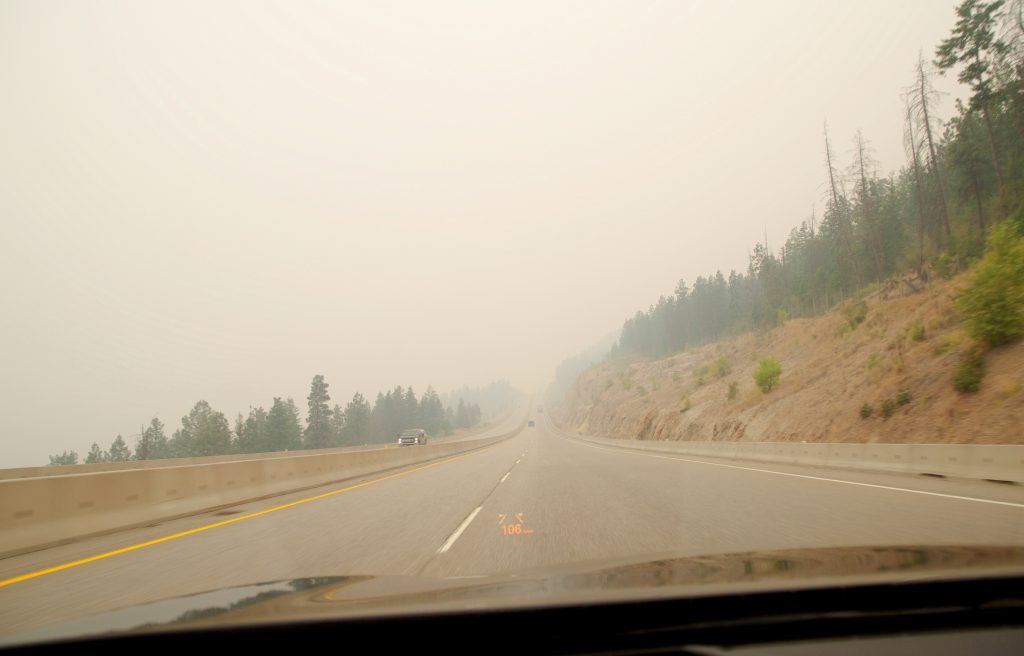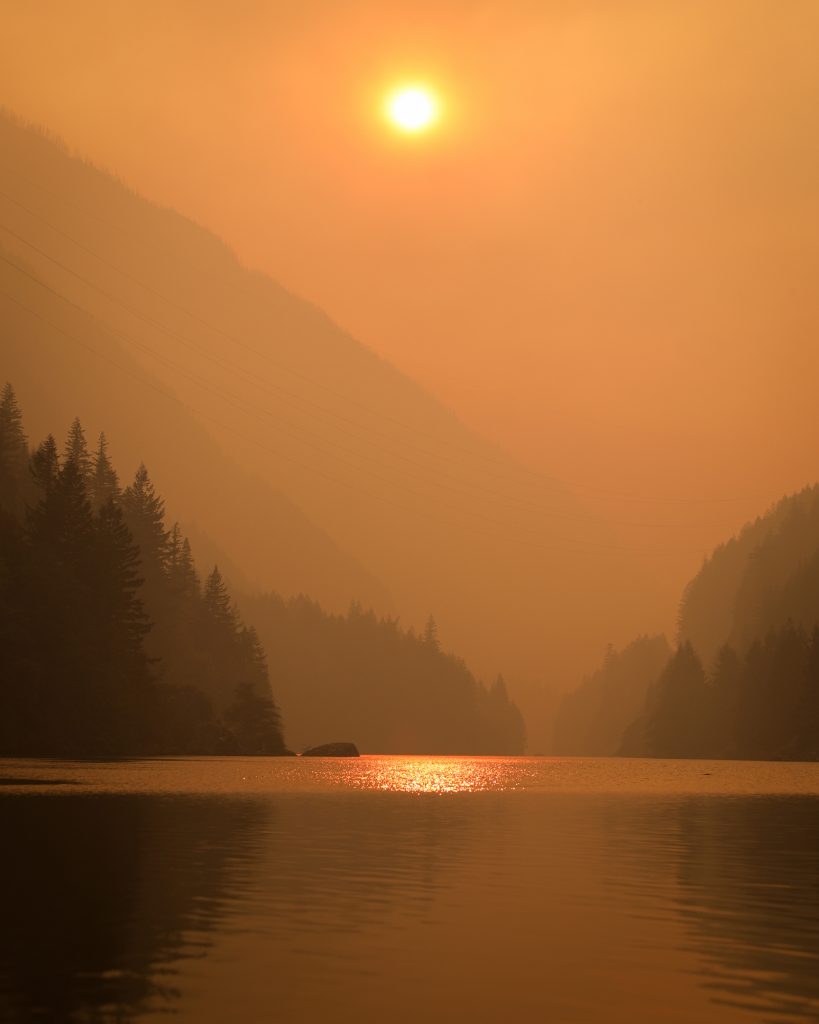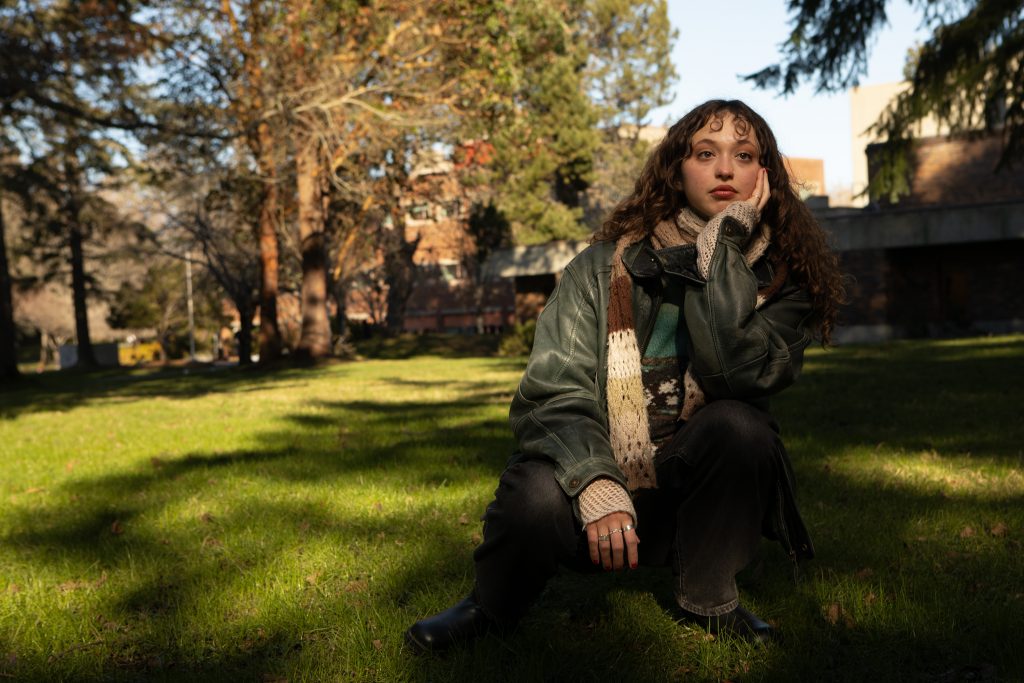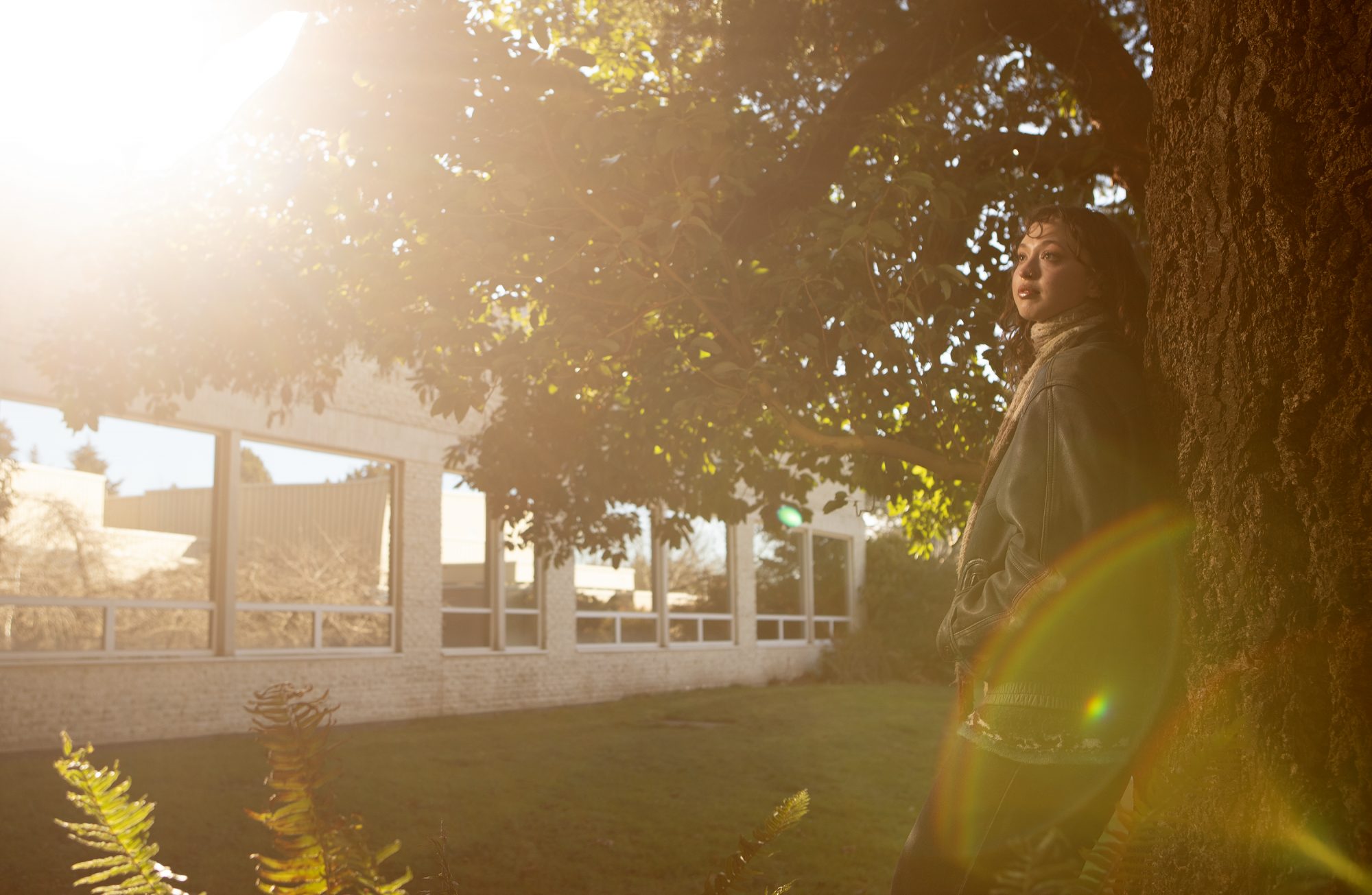Living climate change is a series of personal stories from university students in British Columbia who have lived through climate-related emergencies and disasters.
by Caroline Tucker, as told to Emily Thomson
Photos by Chad Hipolito
Caroline is a fifth-year student at the University of Victoria studying anthropology and journalism. “I love both of those fields of study because they’re very centred on finding out more about the world straight from the source,” she says. Caroline lives in Victoria and plans to graduate in the spring of 2025. She likes art, reading, and listening to music in her free time. “I used to be a big sports player but now mainly partake in more leisurely activities,” she says. Caroline grew up in Vancouver, where she attended high school and lived with her family. She considers herself a social but anxious person, finding that spending time with friends and family helps her not to dwell on things. In her Grade 10 year, she was a full-time student, playing competitive soccer six times a week and recreational school basketball. I was on autopilot throughout a lot of it,” says Caroline. The following summer, Caroline attended a soccer camp in Squamish and witnessed the impact the extreme smoke had on her and her teammates.
In the summer of 2017, my soccer team did a pre-season camp in Squamish for six days at the end of August. We did a pre-season every year but I was not looking forward to this camp. I was dreading it. I had been in school studying my way through Grade 10 and playing soccer six times a week. On top of that, I was doing high school sports three times a week, so I was feeling pretty burnt out. When I would get home after sports at 10:30 or so, I’d be so mentally and physically exhausted that I would just lie in bed and go on my phone. I wouldn’t be able to sleep because I’d still be full of adrenaline. I didn’t have a good self-care routine. We had people who told us about nutrition so I was eating a lot to sustain myself but I was burning so many calories for a growing adult that no matter how much I ate, it probably still wasn’t enough.

We did a pre-season every year but the summer of the wildfires was the first year my team and I stayed in town. I remember that summer being so hot and smoky. The smoke blocked out the sun in Vancouver, so it was this weird cloudy haze and everything became grey. I had driven up to Osoyoos in July and at one point, we were basically driving through a tunnel of fire. The road was at the bottom of a valley and there were these hills around us that were on fire. I almost felt like we were entering hell. At that point in my life, climate disasters felt like this issue occurring very far away. As soon as it started happening closer to home it felt more real.
I wasn’t actually exposed to flames during the camp, but it was so incredibly smoky and hot. It felt like the air was on fire and we were trapped inside a cloud of smoke. I remember it being hard to even breathe. We were on a turf field for most of the day. The smell and feel of turf when it gets hot is like burning rubber. If you bend down, you can see the heat waves emanating from it. At the time, articles were like telling people to stay home and stay inside because being outside was the equivalent of smoking five packs of cigarettes a day.
The coaches thought it would be a great idea to make us run up the mountain for an hour every day. It’s almost as if I had tunnel vision. I remember the smell of the asphalt. It was impossible to get enough water. We would stop running and my throat would be scratchy. I even lost my voice. All you could hear was people gasping for breath. Girls on my team had asthma. They still had to run up the mountains. You’d get to the top and everybody would be heaving, hands on knees, not even sure you’d be able to take full breath for the next ten minutes. I keep picturing one coach, rolling his eyes at us, then being snarky.

The coaches in our club weren’t very understanding. I feel like it’s super normalized in youth sports for coaches to push you past your limit and have absolutely zero empathy for what you could be going through. We would complain because it was so smoky, hot and almost suffocating. The coaches wouldn’t be running, they’d be standing in our ice buckets and not showing us the support we needed. We got ice baths to keep us cool, and we were fed, but that’s about it. There was no moment where they decided the smoke levels were too high. I would have wanted them to cancel the camp and send us home. The smoke levels alone should have made them see it was not a fit environment to be constantly working out in. The smoke levels alone should have made them see it was not a fit environment to be constantly working out in.
I’m very lucky that a fitness camp was the most painful thing that I had to endure, I can’t even imagine what people having to evacuate from the hot zone were going through. But that camp was physically the hardest thing that I had been through as a teenager. It was horrible. By the time camp was over I was so drained. I went home and it was still smoky. I had weird issues with my throat and lungs for the next while, but I can’t say for certain that it was connected to that.
Thinking about it now, it just makes me sad. Although I’ve been very minimally impacted by climate change, I have been impacted in a way, and that really cements the immensity of how other people have been impacted. People are living through this every single day. Since 2017 there’s been a more consistent occurrence of climate-related disasters close to home. In 2017, I felt the closest I’ve ever been to it. Every summer wildfires feel more frightening and real. I remember being young seeing the sun turn gray and feeling so dystopic. Now it’s expected for that to happen at least once a year.

Ultimately, it comes down to policy changes that hold big corporations and fossil fuel industries accountable for their actions. Those are the companies that have the biggest impact on climate change. We should rely less on globalized and industrialized systems because they have an impact on the sustainability of our planet and are affecting our local economies and overall health.
“What gives me hope is how almost everyone I know does something in their life every day to envision a better future for our planet. Strength comes in community and strength comes in numbers and that gives me hope.”
— Caroline Tucker
I feel community-based organizations, restoration and people being connected to the place they’re in are important for envisioning a better future for our planet. When you feel a connection to the environment you’re in, you want to save it and you want to save the people that you’re with.
I hope somebody hears my story and can take away some hope or relate to a feeling I shared. I hope someone can feel inspired and connect with my story because that will lead to more action. Knowing that most people around you have a similar story related to climate change and that we are all affected by it no matter who we are shows we should all care about it and put in the effort to make a change.
This testimony was co-created by members of the Climate Disaster Project at the University of Victoria. The project is an international teaching newsroom that works with disaster-affected communities to document and investigate their stories. For more information, please visit www.climatedisasterproject.com.
